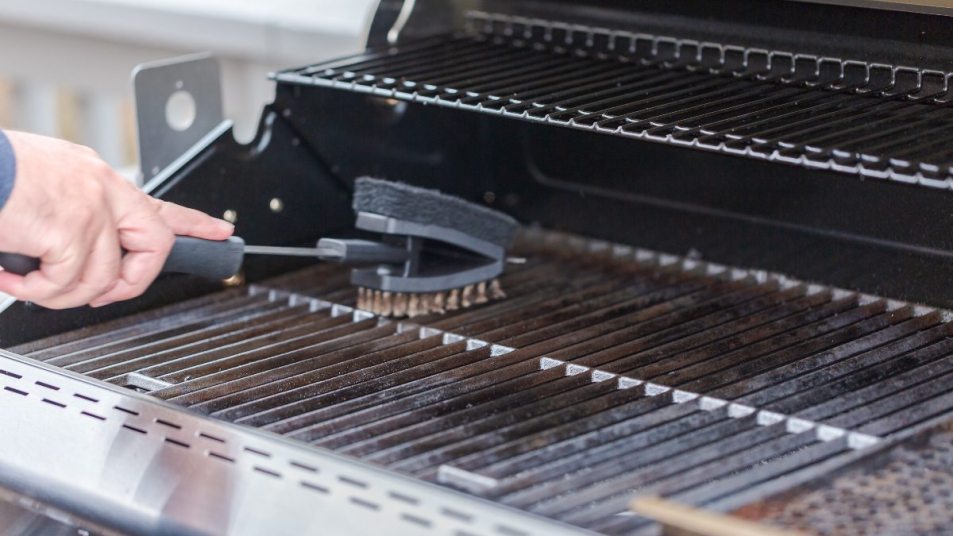
Grilled romaine with a balsamic drizzle. Chicken and veggie kebabs. Apricot glazed barbecue ribs. None of these mouthwatering recipes would be possible without your trusty grill. However, they might become dangerous to eat if you’re making a few common grilling mistakes.
Everyone understands the risks of eating undercooked meat and placing raw foods close to cooked ones on the grill rack. Yet even the “grill masters” of the family can accidentally increase your risk of foodborne illness and exposure to carcinogens. The simple fix: Practice the following safety guidelines the next time you whip out your grilling spatula (or gently explain them to the cookout chef).
1: Try gas instead of charcoal.
Registered dietitian and nutritionist Robyn Goldberg told AARP that propane gas grills are a healthy alternative to charcoal ones. Though charcoal itself is not carcinogenic (potentially cancer-causing), its smoke is. In fact, a 2018 study published in Environmental Science and Technology found that the body absorbs certain toxic compounds in barbecue smoke through the skin as well as through the lungs. The absorption process continued even after the grilling was done, because the smoke stuck to the participants’ clothing. (So, make sure you change your clothes after grilling with charcoal.)
Propane gas grills aren’t cheap, but they usually cost less to use when compared to charcoal grills — so the expenses even out.
2: Clean your grill immediately after using.
It’s not enough to do a simple wipe-down after your busy cookout is over, and it’s not good to leave it dirty and clean up later. (This can promote the spread of germs and bacteria, and food will harden on the grates.) Here are a few tips for cleaning your grill:
- Cleaning while the grates are still hot can damage coatings, leaving the metal vulnerable to rust. Instead, run the grill on high for 10 minutes with the lid closed. Let it cool completely, and then scrape clean.
- Clean the grates with a dry wire brush, grill stone, or ball of aluminum foil. If using a wire brush, check your grill for loose bristles when you’re finished and wipe them away with a wet cloth or paper towel.
- If you see buildup on the burner hoods (the metal plates above the burners), clean with soapy water and a scour pad.
- For a deep clean, soak the burner hoods in hot water and scrub.
A few extra safety and cleaning tips for gas grills:
- Check the fuel line for cracks. Brush soapy water along the tubing and connection points, and turn on the gas. If the soap bubbles along the tubing, you likely have a leak and need to replace it. If the soap bubbles at one or both connection points, tighten the connection.
- Every two or three grilling sessions, clean the venturi tubes — which feed the burners — with soapy water. Even a small block in the tubes can become a fire hazard.
3: Marinating does more than just add flavor.
As the American Institute of Cancer Research (AICR) explains, marinades have a protective effect on your meat.
Charring and cooking meat on high heat causes the formation of potentially toxic compounds. Research shows, however, that marinating your meat for at least 30 minutes can reduce the formation of these compounds — though scientists don’t yet know exactly why this is true. Here are the key marinade ingredients that may help protect your food:
- Vinegar, lemon juice, or wine
- Oil
- Herbs and spices
The takeaway: Don’t skimp on a delicious marinade! For more tips, check out these tricks for grilling marinated chicken and these eight salt-free marinade ideas for your guests avoiding sodium.
"avoid it" - Google News
July 14, 2022 at 12:39AM
https://ift.tt/DdtT5rh
3 Common, Dangerous Grilling Mistakes & How to Avoid - First For Women
"avoid it" - Google News
https://ift.tt/BoVqzvJ
https://ift.tt/2QwZIM9

No comments:
Post a Comment